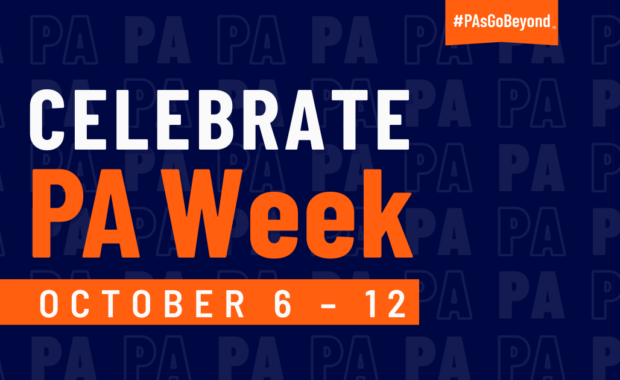AMA House of Delegates Meeting Provides Opportunity to Continue to Build Relationships for PA Practice Advocacy
AAPA Advocacy Staff, Liaison to AMA Share Update on Resolutions and Amended Reports of Interest to PAs
December 2, 2022
By Stephanie Radix
Last month’s interim meeting of the AMA’s House of Delegates (HOD) provided further opportunity to build relationships for PA practice advocacy. Representing AAPA’s State Advocacy and Outreach team, I was pleased to attend the meeting along with AAPA’s Liaison to the American Medical Association (AMA) and AAPA Board Director, David J. Bunnell, MSHS, PA-C, DFAAPA.
“As PA leaders and advocates, it is vital that we engage with our physician colleagues by both listening deeply and having conversations to find opportunities to form partnerships,” Bunnell said. “PAs will continue to advocate for patient-focused, team-based healthcare because we believe this is what is needed to transform health for everyone”.
Since AMA’s resolutions this year were not PA-specific, PA Bunnell did not testify on behalf of PAs during the meeting. However, he noted that many resolutions included language regarding members of the healthcare team that is not productive toward the goal of improving team-based healthcare.
The AMA adopted policies on a variety of issues relevant to patients, including efforts to increase access to fentanyl test strips and other opioid-monitoring supplies to support harm reduction strategies. The delegates opposed the criminalization of pregnancy loss resulting from medically necessary care and athletic eligibility regulations that contribute to discrimination and stigma attached to naturally occurring differences in gender and sexual identity, sexual development, and orientation.
Delegates also adopted amended reports and resolutions and reaffirmed current policy of particular interest to PAs, including the following:
- Collaborative Ethics and Transparency – Council on Ethical and Judicial Affairs Report 2 – Amendment to Opinion 10.8, “Collaborative Care” reaffirmed physicians as the sole clinical leaders in medicine. The remainder of the report was amended to provide that members of healthcare teams, including physicians, PAs, and nurse practitioners among several others, should be candid about their professional credentials, experience, and the role they will play in a patient’s care to promote collaboration and transparency.
- Workforce Shortages and the Role of Nonphysicians in Hospitals – Resolution 206 ̶ The Shortage of Bedside Nurses and Intersection with Concerns in Nurse Practitioner Training reaffirmed existing policies H-160.947, Physician Assistants and Nurse Practitioners, and H-35.996, Status and Utilization of New or Expanding Health Professionals in Hospitals.
These policies call for the AMA to develop plans to assist state and local medical societies in identifying and lobbying against laws that allow advanced practice nurses to provide medical care without the supervision of a physician and favor the archaic Guidelines for Physician/Physician Assistant Practice. Further, these policies call for hospital governing authorities to depend primarily on the medical staff to recommend the extent of functions that may be delegated to, and services that may be provided by, PAs, NPs, and those allied health professionals functioning in an expanded medical support role.
The balance of Resolution 206 was adopted with amendments retitling the resolution to “Nursing Shortage” and calling for the AMA to study and encourage relevant advocacy organizations to study the links between the bedside nursing shortage, expansion of nurse practitioner programs, and the impact of this connection on patient health outcomes.
- AMA Ad Campaign – Current AMA policy, H-405.968, Clarification of the Term “Provider” in Advertising, Contracts and Other Communications, was reaffirmed in lieu of the adoption of Resolution 207—Preserving Physician Leadership in Patient Care. Resolution 207 sought to require the AMA to: 1) create a nationally targeted ad campaign to educate the public about the training pathway of physicians compared to non-physician providers, and 2) conduct a review of the AMA policy compendium and replace conflicting policies referring to physicians as “providers” with the term “physician” when appropriate and report back at the 2023 Annual Meeting. Similarly, Resolution 803 — Patient-Centered Medical Home — Administrative Burdens, was not adopted in favor of reaffirming the current policy, H-160.919, Principles of the Patient-Centered Medical Home, a physician-centric policy that calls for patients to have an ongoing relationship with a personal physician trained to provide first contact, continuous and comprehensive care as part of the physician-led patient-centered medical home.
- Direct Supervision – Resolution 219 — Hold Accountable the Regulatory Bodies, Hospital Systems, Staffing Organizations, Medical Staff Groups, and Individual Physicians Supporting Systems of Care Promoting Direct Supervision of Emergency Departments by Nurse Practitioners was retitled by amendment to, “Promoting Direct Supervision of Emergency Departments by Physicians.” The title reflects the adoption of a new policy that calls for the AMA to advocate that board-certified and board-eligible physicians be the only members of the healthcare team qualified to supervise the provision of emergency care services in the emergency department.
The Takeaway:
It is evident that our call to action is to continue educating decision makers and healthcare leaders about PAs to ensure they understand the perspective of all healthcare providers and – most importantly – continue to focus on providing high-quality, team-based, patient-centered care to transform health.
While the concept of team-based care, an AAPA core value, was admittedly heard more at this meeting on the floor of the AMA House of Delegates, additional opportunities are needed to not only have this conversation but to realize this ideal.
Stephanie Radix is AAPA’s senior director of state advocacy and outreach.
You May Also Like
Release of PA Licensure Compact Model Legislation Critical Step Toward Advancing PA Profession Interstate Practice Mobility
What PAs Should Know About the 2023 Physician Fee Schedule Rule
Final Push for Federal PA Priorities Underway as Clock Ticks on 117th Congress
Thank you for reading AAPA’s News Central
You have 2 articles left this month. Create a free account to read more stories, or become a member for more access to exclusive benefits! Already have an account? Log in.



